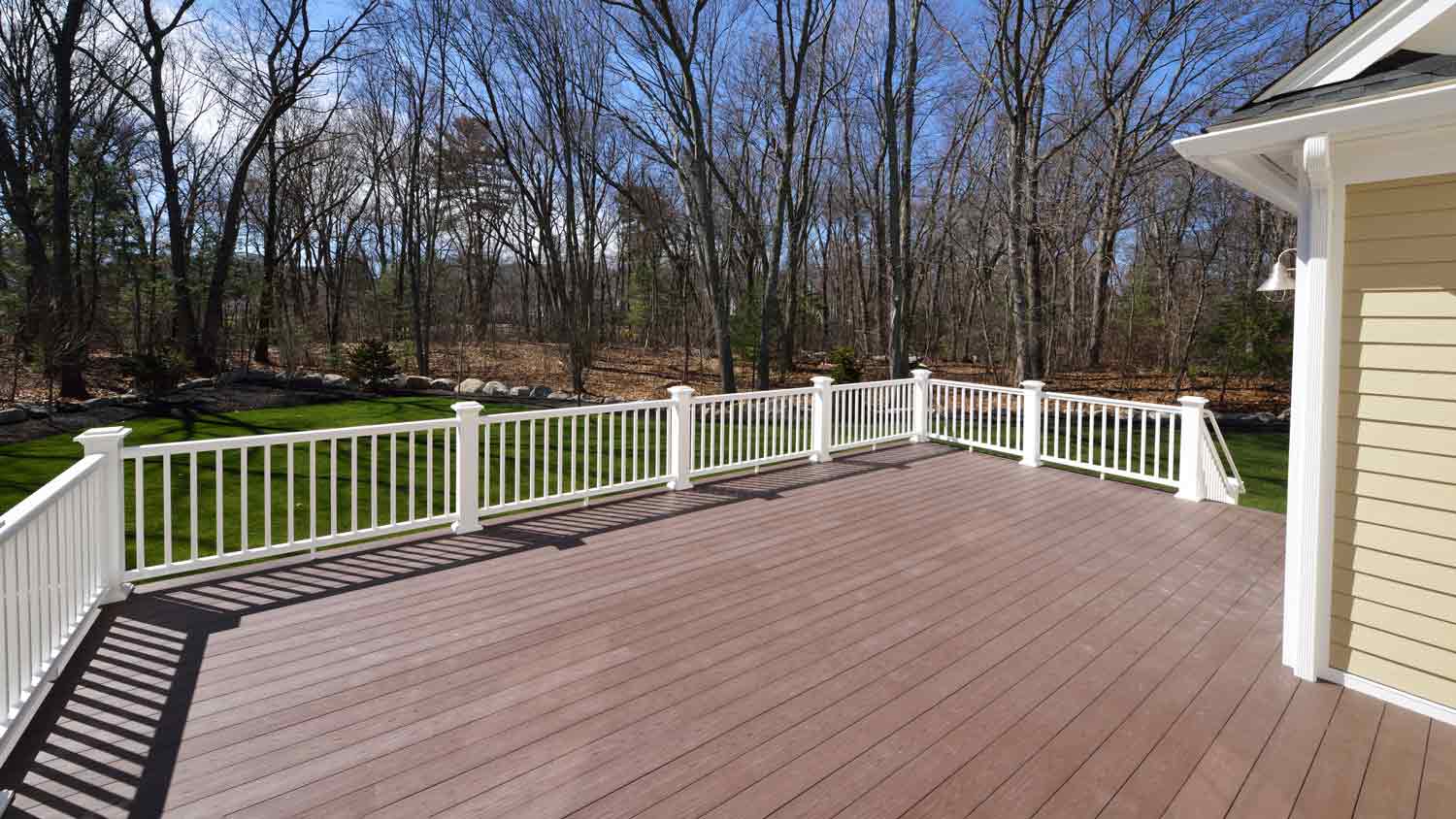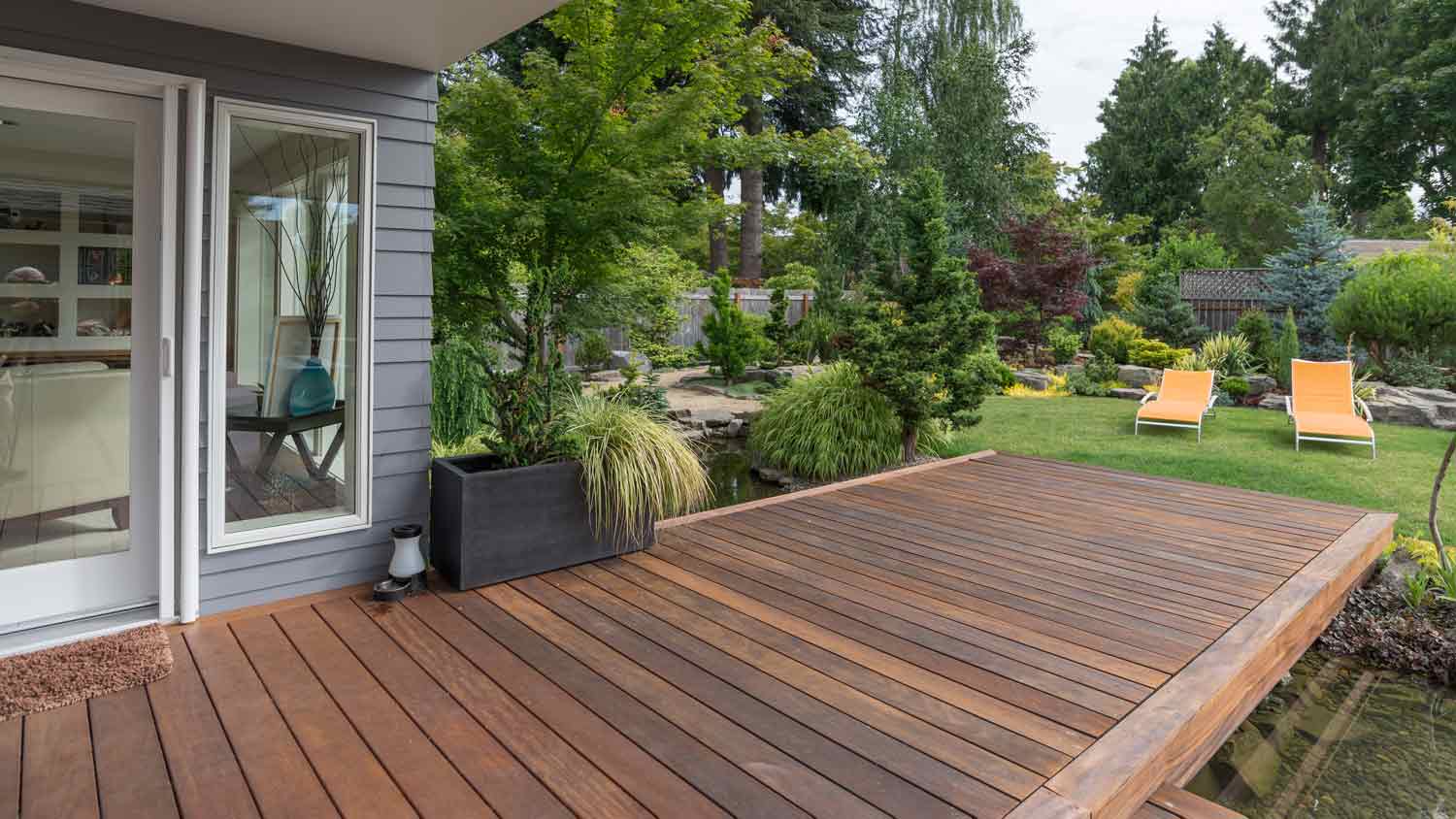
Looking to update your yard with a new outdoor entertaining area? Learn how much a pressure-treated wood deck costs and how to estimate your total.
Redwood deck costs average $18,000, with most homeowners spending between $14,000 and $22,000 on average. Prices depend on deck size, redwood grade, labor, and custom features.


Size, deck type, and design complexity drive redwood deck costs.
Expect to pay $25 to $50 per square foot, including labor and materials.
Professional labor makes up 40% to 60% of your project costs, with rates ranging from $40 to $100 per hour.
Custom features like lighting or railings increase the total price.
A redwood deck can boost curb appeal and home value, with an ROI of 60% to 80%.
This article was created using automation technology and thoroughly fact-checked and edited by an Angi Editor in accordance with our AI policy.
On average, a redwood deck costs between $14,000 and $22,000, with most homeowners paying an average of $18,000. The cost per square foot ranges from $25 to $50, reflecting differences in deck size, redwood grade, and labor rates. Investing in a redwood deck adds beauty and value to your outdoor space while providing a long-lasting, functional area for relaxing or entertaining.
The size of your redwood deck is the single largest factor affecting total cost. Larger decks require more materials and labor, while smaller decks keep expenses lower. Most decks fall between 150 and 600 square feet, but your preferences and yard size will drive your project’s scale.
Multi-level or uniquely shaped decks often cost more per square foot due to added framing, supports, and design complexity. A standard redwood deck costs $25 to $50 per square foot installed, including materials and labor.
| Deck Size (Sq. Ft.) | Dimensions (Ft.) | Average Cost |
|---|---|---|
| 144 | 12x12 | $3,600–$7,200 |
| 320 | 16x20 | $8,000–$16,000 |
| 600 | 20x30 | $15,000–$30,000 |
The type of redwood deck you choose shapes both your budget and your backyard’s function. Some decks are simple ground-level platforms, while others are raised, multi-level, or even set atop rooftops. Each deck type brings unique installation requirements and cost implications.
| Deck Type | Description | Cost Impact | Pros | Cons |
|---|---|---|---|---|
| Ground-level | Sits close to the ground, basic structure | Lowest | Easiest, least expensive to build | Limited views, may have drainage concerns |
| Raised | Elevated with stairs/railings | Moderate increase | Better views, improved airflow | Requires stairs, more framing needed |
| Multi-level | Two or more connected platforms | Highest | Distinct zones, dramatic design | Complex build, higher labor/material costs |
| Rooftop | Built on flat roofs or garages | Highest | Maximizes small spaces, unique views | Structural engineering, permits required |
Several elements drive the final redwood deck cost. Let’s look at the main factors that shape your project’s price tag.
Where you live significantly affects redwood deck cost. Material prices and labor rates are highest in regions like California and the Pacific Northwest, where redwood is popular and demand is strong. In rural or lower-cost-of-living areas, overall project costs are often lower.
Climate also plays a role—decks in wet or coastal areas may need extra treatments and maintenance, which can add to long-term expenses.
Labor is a significant portion of redwood deck cost, often accounting for 40% to 60% of the total. Professionals involved include deck contractors, carpenters, and general laborers. Hourly rates for skilled labor range from $40 to $100 per hour, depending on location and experience.
Complex projects—such as those with stairs, multi-levels, or custom features—require more time and higher skill, raising labor costs. Urban areas often have higher labor rates, while rural regions may offer savings.
Most municipalities require permits for new deck construction. Permit fees range from $100 to $500, though large or complex projects may cost more. Your contractor will often handle the permit process, but you remain responsible for ensuring compliance. Required inspections during and after construction may add further costs, impacting the total redwood deck cost.
Upgrades and custom features can quickly increase the overall price. Built-in seating, planters, or under-deck storage add both functionality and cost. Deck railings—whether wood, metal, or glass—cost $30 to $150 per linear foot, depending on material. Deck lighting and electrical outlets can add $500 to $2,500. Stairs, ramps, pergolas, and privacy screens will each add to the final bill, with custom work costing more than standard options.
Beyond materials and labor, several other factors influence redwood deck cost:
Complex designs (multi-levels, curves, or custom shapes) require extra planning and materials.
Difficult installation sites—such as sloped yards or tight access—raise labor and equipment costs.
Site prep (grading, excavation, or demolition of an old deck) can add $500 to $4,000.
Delivery fees for redwood lumber vary by supplier and distance.
Post-construction cleanup and debris removal may cost $200 to $800.
Custom designs may require architectural plans, costing $500 to $2,500.
Beyond the upfront installation, ongoing and long-term costs can influence the total price of ownership for your redwood deck.
Redwood decking may come with manufacturer warranties, covering defects in materials for up to 20 years. Contractors may also offer workmanship warranties, lasting from one to five years. While these warranties don’t add much to the upfront cost, choosing a contractor with a strong warranty can save you from unexpected expenses down the road.
Annual operating costs for a redwood deck include routine cleaning, sealing, and staining. Expect to spend $100 to $400 per year on maintenance products and supplies. If your deck includes lighting or electrical outlets, budget for a small increase in your utility bills of $20 to $100 per year, depending on usage.
Redwood decking requires regular care to maintain its beauty and resilience. Plan on cleaning and sealing the deck every one to three years, at a cost of $200 to $1,000 each time, if you hire a pro. Compared to composite decking, redwood requires more frequent upkeep but is less demanding than untreated wood. Neglecting maintenance can lead to costly repairs or premature replacement, increasing your long-term redwood deck cost.
Adding a redwood deck may increase your property’s assessed value, leading to higher property taxes. The increase depends on your local tax rate and how your municipality assesses improvements. In most cases, the tax impact is modest, but it’s wise to check with your local assessor before starting your project.
A new deck may affect your homeowners insurance premium, especially if it increases your property value. Make sure to notify your insurer about the new addition. Most policies cover deck-related damage or liability, but coverage details vary, so it’s smart to review your policy or ask your agent about any needed changes.
DIY installation can cut your total bill by 40% to 60%, but we don’t recommend it. Redwood is an expensive material that requires experience to handle correctly, which is why you should leave this project to a local decking pro.
Installing a deck is a significant amount of work, regardless of your fitness level or DIY skills. Leave it to the pros for that reason alone, but also these:
The insurance of a pro and the warranty on their work is an ace in the sleeve of homeowners in case something goes wrong.
Redwood is expensive, and having a pro complete the work ensures you don’t need to buy materials twice.
Pros are able to transport the wood much more efficiently than DIYers.
Many people are physically unable to handle this type of manual labor.
Your time is worth money, too.
You shouldn’t tackle this entire project alone, but there are some things you can do to help, such as:
Clearing the area of furniture, plants, or obstacles.
Having design choices figured out before work begins.
Trim any bushes or trees that enter the deck’s area.
Plan for the space to be off-limits during the work period.
If you already have a redwood deck, you may wonder whether to repair or replace it. Common deck repairs include replacing damaged boards ($15 to $35 per linear foot), fixing railings ($200 to $800), or addressing minor rot. Full deck replacement, however, costs much more but provides a brand-new structure.
The decision depends on the deck’s age, the extent of damage, and safety concerns. If repairs exceed 50% of the replacement cost, or if the structure is failing, replacement is the better choice.
Warranties or insurance may cover some repairs, reducing your out-of-pocket costs. For example, repairing a few boards is often worthwhile for a newer deck, but extensive rot or structural issues in an older deck often call for replacement.
A redwood deck is more than just a beautiful upgrade—it can also boost your home’s value. On average, homeowners recoup 60% to 80% of their redwood deck cost at resale. A well-designed, well-maintained deck enhances curb appeal, expands usable living space, and attracts buyers seeking outdoor amenities.
Redwood decks often provide a higher ROI than many other outdoor improvements, such as patios or elaborate landscaping. To maximize your return, focus on quality materials, thoughtful design, and regular upkeep. Additional benefits include improved safety, versatile entertaining space, and timeless natural beauty.
Consider these cost-saving strategies to make your redwood deck project more budget-friendly:
Choose a smaller or simpler deck design to lower material and labor costs.
Select a lower-cost redwood grade that still meets durability needs.
Schedule installation during the off-season for potential discounts.
Get multiple quotes from licensed local deck contractors.
DIY certain tasks (e.g., demolition, staining) if skilled and safe.
Opt for standard shapes and avoid complex customizations.
Maintain your deck regularly to avoid costly repairs.
Get multiple quotes from different pros to compare materials, labor, and warranties.
Ensure that whoever you hire gets their redwood from a sustainable source.
Consider any add-ons, such as stairs, benches, hot tubs, or other enhancements.
Home is the most important place on earth, which is why Angi has helped more than 150 million homeowners transform their houses into homes they adore. To help homeowners with their next project, Angi provides readers with the most accurate cost data and upholds strict editorial standards. We extensively research project costs to develop the pricing data you see, so you can make the best decisions for you and your home. We rely on reputable sources, including the U.S. Bureau of Labor Statistics, academic journals, market studies, and interviews with industry experts—all to ensure our prices reflect real-world projects.
Want to help us improve our cost data? Send us a recent project quote to [email protected]. Quotes and personal information will not be shared publicly.
From average costs to expert advice, get all the answers you need to get your job done.

Looking to update your yard with a new outdoor entertaining area? Learn how much a pressure-treated wood deck costs and how to estimate your total.

Vinyl is a durable and relatively inexpensive choice of decking material. Your vinyl deck cost will depend on labor, the deck size, and more.

Building a composite deck can increase your home’s appeal and value. Composite decking costs depend on the size of your deck, the materials, labor, and more.

Why is my composite deck warping? There are a few key factors at play. Learn more about common problems and how to fix them to get to the bottom of it.

Does your deck make loud popping noises? This is a common and usually natural occurrence. Learn why popping happens in a deck and how to fix it when needed.

Improve your DIY skills and create new ones by learning how to build a pergola of any kind using your knowledge of a few universal steps.